How to Effectively Hire and Manage a Digital Marketing Agency
When it comes to running a business, choosing the right digital marketing agency to propagate your digital marketing efforts can mean the difference between success and failure. Among the many success stories, there are also pockets of horror stories that are sure to raise the alarm bells for any business owner or marketing manager.
This article will provide you with all the information you need to know before stepping out to hunt for your own digital marketing agency. It covers everything from what a digital marketing agency is, the pros and cons of hiring one, the services offered, pricing structures used by agencies, and even some tips on managing one if you decide to engage the services of a digital marketing agency.
Let’s begin by understanding the various digital marketing service providers available in the market.
1. What is a Digital Marketing Agency?
1.1. Definition & Purpose
A digital marketing agency is a business whose main purpose is to market its clients’ businesses, products and services in a rapidly evolving digital world. Digital Marketing Agencies have to be innovative and in touch with the digital landscape and use industry best practices to leverage the tools, strategies and tactics at their disposal to have their services exceed clients’ expectations and deliver results in a measurable and timely manner.
1.2. What you can expect from a Digital Marketing Agency
While there are a variety of digital marketing agencies out there, any decent agency needs to understand your business goals and what you require from your marketing efforts — regardless of what services they may provide.
In return, you need to be open about what you want from them, be clear about how they expect to be paid and decide if hiring their services will give you your desired return on investment (ROI).
2. Brief Overview of Digital Marketing Service Providers
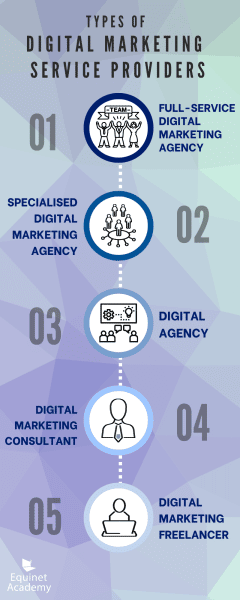
2.1. What is a Full-Service Digital Marketing Agency?
Full-service digital marketing agencies are generally a one-stop-shop for digital marketing services. They are made up of many departments that focus on individual aspects of digital marketing, thus allowing the agency to provide holistic digital marketing strategies for their clients.
2.2. What is a Specialised Digital Marketing Agency?
Specialised agencies,also known as “niche” agencies, are digital marketing agencies that focus solely on one area of digital marketing. Examples of this are specialised agencies that only conduct Search Engine Marketing or those that focus on Website Design.
2.3. What are Digital Agencies?
Digital Agencies are agencies that focus on the development of digital products, such as mobile apps or website development. In general, a digital agency provides clients with strategies, creative designs and technical development for screen-based products and services.
2.4. What is a Digital Marketing Consultant?
A digital marketing consultant is a professional who is hired by businesses to assess the effectiveness of their current paid and organic digital marketing strategies and provide solutions to optimise and perhaps even revamp the strategies in place. They may also help to develop, implement and monitor the results.
Their expertise is sometimes used to help in-house marketing teams improve, help businesses in their dealings with external digital marketing agencies or sometimes check on a freelancer’s digital marketing efforts and offer advice.
It should also be noted that digital marketing consulting services are offered in some full-service and specialised agencies as well.
2.5. What is a Digital Marketing Freelancer?
Digital marketing freelancers are individuals who are usually digital marketers themselves, providing digital marketing services. Some of them work alone, while others have small teams or other freelancers they use to outsource certain aspects of the job. Most digital marketing freelancers specialise in a niche and rarely handle full-service digital marketing campaigns.
2.6. Which Digital Marketing Service Provider Should You Choose?
When it comes to choosing the right service provider, there are a number of factors to consider:
- Business objectives. Is the agency able to understand and align with your objectives?
- Marketing budget. Are you able to hire one or multiple agencies?
- Manpower skill levels and management resources. Is your in-house team able to effectively communicate and manage the campaign deliverables?
Perhaps in order to make a better-informed decision of what type of agency you should hire, you need to get a better understanding of the types of digital marketing services available in the market today. After all, the digital marketing services an agency provides ultimately shapes that agency.
3. Types of Digital Marketing Services
3.1. SEO services
SEO stands for ‘Search Engine Optimisation’, and it involves the optimisation of online content to rank high on search engines for specific keywords. This in turn increases the quantity and quality of website traffic and brand awareness.
3.2. Content Marketing Services
Content marketing services involve the creation and strategic distribution of high-quality content on a consistent basis for the purpose of attracting and acquiring a target audience to eventually turn them into paying customers.
3.3. Social Media Marketing Services
Social media marketing services involve the use of social media platforms such as Facebook, YouTube, Instagram, LinkedIn, TikTok etc. Social media campaigns will utilise these platforms to connect with target audiences in order to increase sales, drive traffic, and build brands.
3.4. Email Marketing Services
Email marketing services involve the creation of personalised and targeted messages that are sent out via email to new or existing customers to get them to perform a variety of actions that can include visiting a site or making a purchase among others.
3.5. Digital Advertising Services
Digital advertising services involve any kind of communication over paid channels to promote and advertise a company’s services, products and/or brand using the various digital channels, platforms, and resources available.
3.6. Digital Marketing Strategy Consultation Services
Digital marketing strategy consultation services involve the planning, development, implementation, monitoring and optimisation of a business’ organic and paid digital marketing strategies.
3.7. Digital Marketing Analytics Services
Digital marketing analytics services involve the use of tools to analyse and report on the digital marketing data collected via all the digital channels a business utilises. The most common digital marketing analytics tool used today is Google Analytics.
3.8. Web Design Services
Web design services involve the development of a business’s website’s graphic design, logo design, web hosting, flash design, multimedia presentation, and video content by making them user-friendly.
3.9. Web Development Services
Web development services focus on the non-design aspects of website building. These services involve the writing of code and markup in order to optimise the website to exist on the internet or intranet.
3.10. Mobile App Development Services
Mobile app development services involve delivering a complete functional solution in the creation of mobile applications; from deciding how they will serve wider business needs, to the user interface design (UI) and user experience design (UX) of the app, to testing the mobile app, deploying the app or publishing the app on an online market like the App Store or Google Play Store.
3.11. Creative Design Services/Graphic Design Services
Graphic design services involve the utilisation of visual configurations to convey ideas and solve issues via the strategic use of lettering, typeface, colours, form, and images etc.
3.12. E-Commerce Marketing Services
E-commerce stores are online shops that sell, buy (or both) goods and/or services. These stores usually don’t have a brick-and-mortar outlet and operate solely on the internet.
With the emergence of these online stores, their needs are often niche, hence the need for specific digital marketing services that cater to such stores. E-commerce marketing agencies can be either full-service or specialised, and they strategically use technology, creative solutions, and marketing to help e-commerce stores achieve their goals.
3.13. Branding Services
Branding involves the creation of a business’ identity. Branding services include logo design, creating style guides, social media branding, developing a brand’s voice, positioning a brand strategically, and crafting a brand’s message. These efforts can be put forth to build a brand’s identity from scratch or to rebrand an already established business.
3.14. UI/UX Services
User interface (UI) services involve the development and design of all digital touchpoints that a user has to engage with during the course of using a product or service digitally. This includes lights, touchscreens, sounds, screens, and keyboards.
User experience (UX) design services are carried out by design teams who strategically integrate a business’ product into an online marketplace through using intelligent design elements to craft a solid brand identity while having practical functionality, ensuring the product has an optimal experience for its users.
The main difference between UI and UX is that UI is the entire ecosystem of digital touchpoints that a user has to interact with, i.e. the technical aspects, while UX deals with what the user takes away after interacting with the digital product or service, i.e. how the user would feel etc.
3.15. Video Services
Video services provided by a marketing agency might include anything from storyboarding/conceptualisation to production (filming) and even post-production (editing).
3.16. Performance Marketing Services
Performance marketing services are special compared to other marketing services in that the client only pays if their desired goal is reached — a sale, click, or lead etc. Performance marketing services include online marketing and advertising campaigns that are targeted to a client’s needs. It also includes measuring the results of the campaign(s) to measure if the desired results have been achieved.
3.17. Marketing Automation Services
Marketing automation services involve the use of software to help identify potential users, move the users down a company’s marketing funnel, and identify important information to optimise marketing tactics. By automating these processes through the use of software, it helps marketing teams free up their time to focus on other areas such as overall strategy etc.
3.18. Conversion Rate Optimisation Services
Conversion rate optimisation services involve the tweaking of the multiple factors that go into causing visitors to perform a ‘goal action’ on a website. The ultimate aim of conversion rate optimisation is to increase the percentage of website visitors who are performing ‘goal actions’ on the site – buying a product or service, adding items to their e-cart or clicking a link etc.
3.19. Content Creation Services
Content creation services are wide-spanning; they involve creating content for websites, landing pages, display ads, social media, and email marketing just to name a few. While elements like tone and design may vary, at the end of the day, the content created needs to be aligned with business goals, digital strategy, the brand’s persona and the customer’s persona.
3.20. Landing Page Creation Services
Landing page creation services include creating an actual landing page using the information provided by clients (colours to use, overall design goals etc.), making revisions along the way, and optimising the page and its various elements to achieve the best results.
3.21. Copywriting Services
Anything you see on the web usually has some form of copy (i.e. words). From websites, to ads to blog posts. Copywriting services, put simply, involve using the necessary skills to write copy that results in users/customers taking a desired action that the business/client deems as a goal.
Now that you understand the various types of services digital marketing agencies offer, you might be wondering how pricing structures work in a digital marketing agency. There are six pricing models offered in digital marketing agencies– not every agency will offer all six, but rather, pricing structures will depend on the types of services offered at the particular agency.
4. Pricing Models in Digital Marketing Agencies
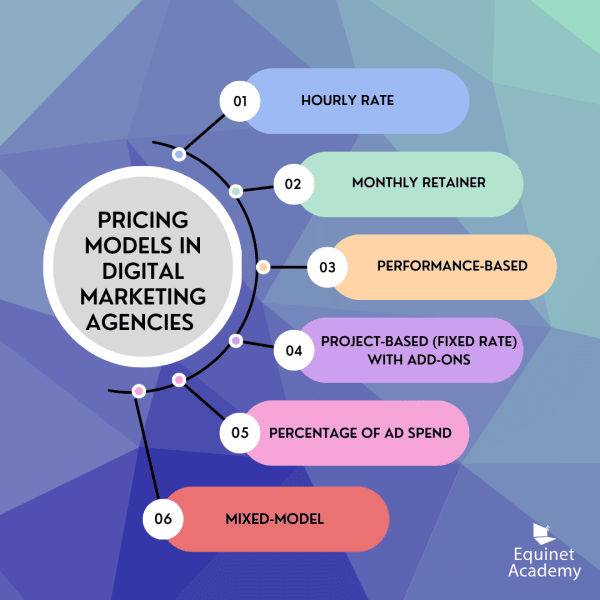
4.1. Hourly Rate
As the title suggests, an hourly rate charge would entail paying an agency by the hour for any of the services they render. How high or low the hourly rate is would depend on a few factors, some of which include the expertise of the agency and the scope of the work they are undertaking.
4.2. Monthly Retainer
Paying an agency a monthly retainer would entail paying a fixed sum every month in advance. This is an ideal arrangement if the work the agency is undertaking is long-term.
4.3. Performance-Based
A performance-based charge is when an agency charges a client only if the agreed-upon desired outcome(s) from the campaign are achieved.
4.4. Project-Based (Fixed Rate) with Add-Ons
For this form of charge, a fixed amount would be charged by an agency for a project that it undertakes, based upon an agreed-upon task list and timeline. Any additional services that are required/requested mid-way through the work would be charged as an add-on.
4.5. Percentage of Ad Spend
A percentage of ad spend pricing model is sometimes used for digital advertising services. In this pricing model, the agency is paid based on a percentage of the clients’ ad spend budget.
4.6. Mixed-Model
As the name suggests, mixed-model pricing deals with a blend of the various pricing structures mentioned above. This is especially useful when campaigns have a mix of digital marketing services involved in one project.
Now that pricing models have been discussed, you might be wondering if you should take that leap to hire a digital marketing agency. Let’s first look at why you might want to consider engaging the services of a digital marketing agency.
5. Why Engage a Digital Marketing Agency?
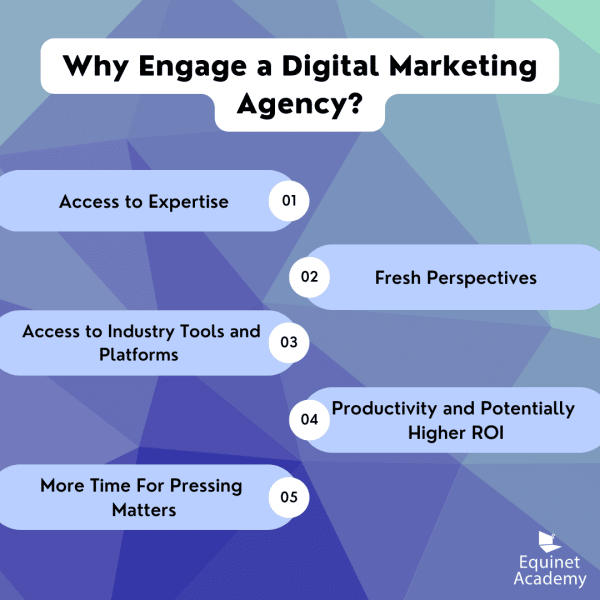
5.1. Access to Expertise
Sometimes, in-house marketing teams (especially lean ones) may not have the expertise to execute certain marketing tasks. Moreover, the process of finding and hiring the right people is time-consuming, and training them can be costly.
Hiring a digital marketing agency to take care of your marketing needs can keep payroll costs down. With a full-time employee, the costs involve base salary, health insurance, pension funds (CPF), paid leaves, as well as recruitment and training costs.
Not to mention that sometimes, despite training, staff might remain incompetent. This quickly adds up to an expense that’s much more costly than simply hiring a capable digital marketing agency to do the job.
According to CareerBuilder, an employment website that provides job opportunities and advice, 74% of companies who hired the wrong employee for the job lost approximately US$14,900 per poor hire.
With a competent digital marketing agency, you’ll have access to top-notch digital marketing talents in a snap. With their expertise at your disposal, you’ll be able to scale your marketing campaigns up and down easily.
5.2. Fresh Perspectives
Most employees, especially those who have been in a company for a while, might have tunnel vision when it comes to certain aspects of marketing campaigns and wider business functions. Hiring a digital marketing agency to handle marketing functions would give such an employee a fresh perspective that only an outsider can give.
Digital marketing agencies would also give you access to industry best practices, give your marketing campaigns a competitive edge, and keep you in the loop with up-to-date industry trends so you can decide if you want to adopt them or not.
5.3. Access to Industry Tools and Platforms
Marketing tools, software and workstations aren’t exactly cheap. Procuring the best marketing industry tools can be costly, and on top of that, the cost of setting up the proper workflows post-purchase would take a lot of time — time that could be spent on other more productive and pressing tasks.
These issues are easily solved when engaging a digital marketing agency because they usually already have the best tools, software, workstations, and workflows in place to deliver optimal results to their clients.
5.4. Productivity and Potentially Higher ROI
Digital marketing agencies always quantify their performance with measurable analytics and agreed reporting. The agency and your team might have an agreement to conduct weekly or bi-weekly reports on the status of the various campaigns the agency is running for your business, helping you track key performance indicators (KPI) that matter.
This also frees up your team’s time, because they wouldn’t have to compile reports and monitor results constantly. The optimisation tactics that would be agreed upon during the meetings would also allow for potentially higher ROI — and remember, the agency will be doing all the executing.
5.5. More Time For Pressing Matters
Running successful digital marketing campaigns is time-consuming. Even if you have an in-house marketing team, it’s common to have team members who specialise in a certain marketing discipline, leaving room for error in areas they don’t have a strong grasp on.
Rather than spending time trying to play catch-up, they would be able to focus their time on more pressing marketing issues that would be best solved with their expertise. The ability to delegate work to a digital marketing agency is the value in this regard.
Of course, as with anything, there are downsides. The next section outlines some cons of hiring a digital marketing agency — by painting a full picture for you, hopefully, you’ll be able to make a more well-informed decision.
6. The Downsides of Hiring a Digital Marketing Agency
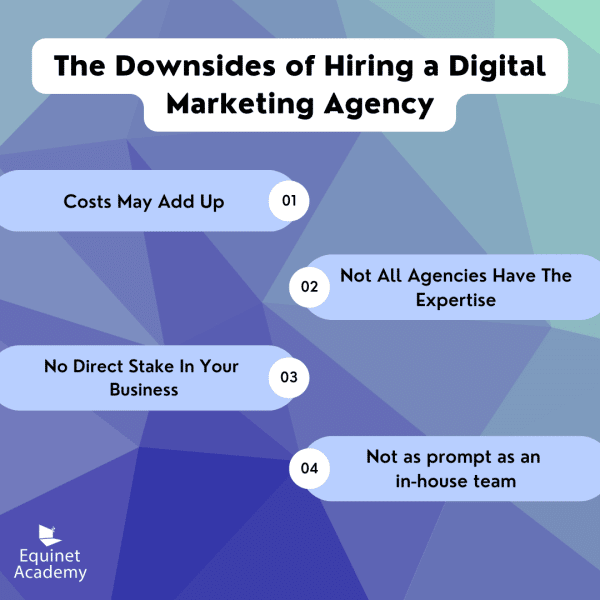
6.1. Costs May Add Up
This would especially be the case if you’re hiring a digital marketing agency for a long period of time. It’s important you decide if you have the appropriate budget to handle the costs of hiring the services of a digital marketing agency before diving into signing any contracts.
6.2. Not All Agencies Have The Expertise
Before engaging the services of a digital marketing agency, always make sure you know exactly who will be working on your campaigns. Transparency is paramount in this regard because you don’t want to have inexperienced members of the agency leading your account — which is especially common in agencies that are downsizing or facing a talent shortage.
By having your own knowledge about digital marketing, you can prevent your team and yourself from being kept in the dark about aspects that are being underdelivered by the agency. A great way to do this is to level up your team and yourself by taking some quality digital marketing courses.
6.3. No Direct Stake In Your Business
Digital marketing agencies don’t have a direct stake in a business the way an in-house marketing team would, which can potentially pose problems in these areas:
- Not being able to offer you big-picture advice such as whether or not you can actually afford their services, as they wouldn’t know your budgets and overall financial capabilities.
- Cultural differences. While a non-tangible factor, ensuring the digital marketing agency you hire understands your company’s culture and is able to communicate effectively with your in-house marketing team is important for the success of campaigns.
- Longer turnaround times. If you’re relying solely on a digital marketing agency for your marketing efforts, it’s important to bear in mind that their turnaround times would be longer than that of an in-house marketing team. After all, you’ll just be one of their many clients.
A great way to mitigate these risks is to understand how the operation should be run. Having at least a foundational understanding of the various marketing functions that go into your campaigns would allow you to tell more accurately whether the agency you’re working with could be performing better, if they are performing up to par or exceeding expectations.
6.4. Responsiveness is not as prompt as an in-house team
It is good to note that bigger companies have an in-house agency structure-like team.
Now that you have a clearer picture of the pros and cons of hiring a digital marketing agency, let’s dive into how to manage one if you do decide to engage their services to further your digital marketing efforts.
7. Tips to Effectively Hire a Digital Marketing Agency
7.1. Understand your goals and objectives
The first crucial step of beginning the agency hiring process is to first have a clear vision of what marketing goals and objectives your business is out to achieve– if you don’t know what you’re trying to achieve, you can’t expect the agency to know.
A good way to begin is by developing a digital marketing strategy in-house. You’ll be in a much better starting position if you create the framework for yourself. Once the agency comes on board, they’ll be able to help out with refining your strategy and offer their expertise to make it much more actionable.
7.2. Conduct Research
It’s very important to do your due diligence when sourcing for a digital marketing agency. Google’s a great way to discover information. Conduct background research on agencies you’re interested in hiring, read reviews and ask peers in your industry for their recommendations. Attend industry meetings and events so that you can cast a wider net than your existing contact list. If you want a launching point, consider using our agency proposal form to get connected with suitable digital agencies for your digital marketing requirements and budget.
As a rule of thumb, established, award-winning agencies usually charge higher fees than boutique agencies, which tend to offer more flexibility in their fees.
7.3. Interview Agencies
Once you’ve decided on a list of potential digital marketing agencies to hire, interview them before deciding on which to hone in on. The following are key areas to understand before making your decision:
- The frequency of reporting.
- How they measure success.
- Check if they have completed projects that are in similar industries like the one you’re in — and check if they achieved the objectives they set out to achieve. If not, find out why. Another important reason to check if they’re working with clients in your industry is to ensure there isn’t a conflict of interest.
- Understand how they’ve handled past client disputes.
- Get to know the team you’ll potentially be working with — are the people inexperienced? Check the level of experience of each member of the team and ensure there are seniors to guide the less experienced members who might be interns and fresh graduates.
Don’t be afraid to ask for the CVs of the team members who will be working on your project, and if possible, either visit the agency’s office and observe them in their element. However, with Covid restrictions, zoom meetings with the entire team would suffice.
- Assess what the agency is trying to sell you — are they selling you what you don’t need, and is their pitch focused on helping you problem-solve, or are they simply selling you their solutions. This is why understanding your goals and objectives clearly first is important.
- Decide if you and your team are able to communicate with the agency team — are they able to comprehend your requirements, or do you find yourself repeating yourself a lot? A good client-agency relationship is one where the agency intuitively understands the client, can read between the lines, and delivers.
7.4. Request for Proposal
Once you’ve decided on an agency to potentially hire after your interview process, request for a proposal based on your digital marketing requirements. When you and your in-house marketing team are looking through their proposal, take note if it checks these boxes:
- Demonstrates a clear understanding of the brief
- Showcases clarity in the scope of their proposed tactics and deliverables
- Explains clearly and in detail the mechanics of how the strategy, plans, and resources will be delivered
- This is optional, but it would be ideal if the proposal contains case studies, similar examples, or mockups (mockups are contingent on your project’s budget)
- Is very clear and explicit on costings and terms and conditions
Money-back guarantees are also a sign that an agency isn’t reputable, and if they don’t give you a full breakdown of their fees and services, it shows that either the agency isn’t clear with what they have to deliver, or they are too lazy to do a detailed breakdown.
An example of this is an agency having “Digital Advertising Services” as an invoice item, and not breaking it down into the cost of designing ad creatives, setting up ad campaigns, and monthly reviews.
7.5. Start Small
If you decide to go ahead and hire a digital marketing agency, a good way to begin your relationship is to start small. For instance, for a smaller boutique agency, get them to create a simple Google Ads campaign first and measure the results there.
If the agency is more experienced, conduct a first quarter review instead, with the option to terminate at the three-month point in case of issues. Once you’re convinced that they can deliver, hire them for a bigger project or get them to manage other digital channels.
Most agencies are open to a progressive approach, so don’t be afraid to start small.
8. Tips to Effectively Manage a Digital Marketing Agency
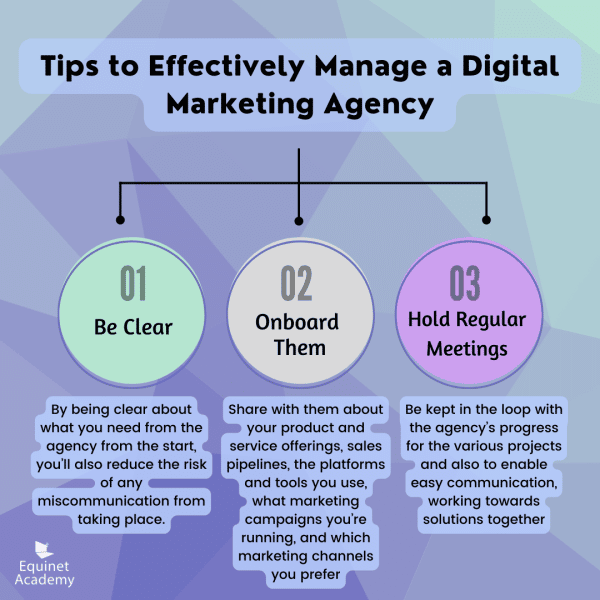
8.1. Be Clear About What You Need From Them
Much like being clear about your own digital marketing goals and objectives, you have to be aware of why you’re hiring a digital marketing agency. Once you have the end in mind, it will be much easier to manage the agency along the way, and you’ll understand if the progress they’re making is up to par or not.
By being clear about what you need from the agency from the start, you’ll also reduce the risk of any miscommunication from taking place, which, if it happens, can definitely slow a project down or waste budgets.
8.2. Onboard Them To Your Business
When you bring a digital marketing agency on board, you have to bear in mind they aren’t as invested in your own business as you are. Don’t hold back details and assume they understand things — share with them about your product and service offerings, be transparent about your sales pipelines, share the platforms and tools you use, what marketing campaigns you’re running, and which marketing channels you prefer. Your brand, style, and content guidelines are also something you have to ensure they understand.
In the same vein, keep them updated in a timely manner whenever there are new products and services, promotions, and changes within your company. Never assume they already know things, and adopt a good habit of over communicating.
8.3. Hold Regular Meetings
This is important so that you’re kept in the loop with the agency’s progress for the various projects they are helping you accomplish, and also so both you and the agency can ask each other questions to iron out issues and/or speed things along.
It’s very important you let the agency know how often you expect a progress report from them — let them know how often you’ll expect calls, and how promptly you’ll expect emails to be answered in order to keep the cogs of communication turning.
If there’s a common thread running through the three management pointers above, it’s to over communicate. When transparency, honesty, and regularity is present in your communication with the digital marketing agency you hire, that’s more than half the battle won, and you’ll likely have a good and lucrative relationship.
Conclusion
Managing a digital marketing agency is a skill, but a skill made much more easy to handle if you have the relevant knowledge about digital marketing. One of the best ways to do this is by attending quality digital marketing courses.
At Equinet Academy, our trainers have vast knowledge and experience in their fields of expertise, and are dedicated to imparting their knowledge to you. With that knowledge, you’ll be able to communicate better with agencies, work more productively, and manage digital marketing agencies better overall.
Consider signing up for our digital marketing courses today, and change your approach to managing your digital marketing agency.
We offer a Certified Digital Marketing Strategist (CDMS) Programme, which covers the following six modules:
- Digital Marketing Strategy
- Content Marketing Strategy
- Search Engine Optimisation
- Digital Advertising
- Social Media Marketing
- Digital Marketing Analytics (Google Analytics 4)
Learners who complete these modules will be awarded a Certified Digital Marketing Strategist certificate. The courses are all WSQ accredited and are available for up to 70% subsidy.